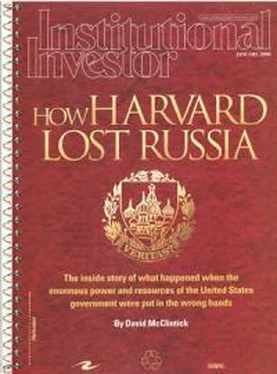Gilman should know. He was named a senior member of the International Monetary Fund’s Russia team in 1993, just after the Clinton administration took office. He moved to Moscow in November 1996 and remained until 2002. Along the way he married a prominent Russian political columnist, Tatiana Malkina, gaining thereby unusual access to the Russian government at its highest levels, and, as well, “a special insight into the way that Russians really see their world.”
Today he is a professor at Moscow’s State University’s Higher School of Economics. And it is from this vantage point that Gillman seeks to set straight various “dangerous stereotypes” and to put to rest a lingering “suspicion of corruption that accompanied the discussion of Russian financial matters” in the second half of the 1990s.
No Precedent, No Plan ascribes the various scandals of 1999 to fabrications designed to discredit opponents, a familiar enough tactic in Russian political campaigns. So it is strange that the book contains no mention of the well-documented Moscow scandal that set the scene for various perceptions that followed the IMF-supervised restructuring of Russia’s external debt in August 1998.
It was in 1997 that the US Agency for International Development fired the Harvard University team that it had assigned four years before to advise the government of Boris Yeltsin. Evidence had surfaced that the team leader, Harvard professor Andrei Shleifer, his wife, his deputy and the deputy’s girlfriend, had, in the office of their Russians advisees, muscled aside legitimate firms in order to obtain for themselves the first license to distribute mutual fund shares in a vast impending privatization.
Shleifer’s good friend and mentor, Harvard economist Lawrence Summers, who as a member of the department had been involved in assembling the team in the first place, remained at the Treasury Department, where, as deputy secretary, he oversaw the US response to the Russian crisis in 1998. In 1999 he became Treasury Secretary himself, replacing Robert Rubin. In 2000, the US government sued Harvard and the others for fraud and, after the matter was extensively litigated, recovered its fee. Summers, meanwhile, was named Harvard’s president and, not long after, recruited Rubin to Harvard’s seven-member governing Corporation. Five years later, Summers’ handling of the Russia project over the years was deemed by The New York Times to have been a significant factor in his dismissal.
When Summers returned to Washington in 2009 as chief economic adviser to President Barack Obama, Shleifer’s wife, hedge fund operator Nancy Zimmerman, was noted by the Times to be among his inner circle of informal advisers, along with Laurence Fink, chief executive of BlackRock, the large money management firm, and H. Rodgin Cohen, chairman of the Sullivan and Cromwell law firm, and several others. .
Yet not even Shleifer’s name makes the cut in No Precedent, No Plan when Gilman writes, “The World Bank Staff members and those of other international agencies, some western think tank and academic advisers such as [Anders] Aslund, [Richard] Layard and [Jeffrey] Sachs, and the G-7 financial attaches based in Moscow also had privileged access, but none were able to have such a comprehensive overview of the macroeconomic situation on a continuing basis as the IMF.”
So when Gilman recently spoke at Harvard’s Russian Research Center about his book, I stopped by to hear him. Towards the end of his talk, I asked about the Harvard project, and he gave what seemed to me a genuinely forthcoming answer.
“I’m going to say something very politically incorrect. I think it was a tempest in a teapot, a teacup. I thought the whole things overblown and exploited. I’m not saying that there weren’t elements of poor judgment involved. I think that in terms of foreign technical assistance to the Russians, I think they actually made a valuable contribution, compared to some other institutions that were involved there. I think it was a sad outcome, sloppy, as I say, poor judgment, but I just don’t think it should have been exaggerated the way it was. There were a lot of enemies out there…. I don’t really know enough about the details and I don’t like to get involved in that kind of stuff.”
“The collapse of the Harvard mission, amid widespread publicity in Russia, caused no discomfiture to the IMF?”
“No. No. Because if every time there was some impropriety, or accusation – we’re not judges – if every time there was an impropriety, we could have never done anything. You raise a good point, because later, we were not able to overlook improprieties, not in 1997 or ’98, but when scandals that I mention [in the book] started… then minor charges of these kinds… the IMF could [no longer] ignore.”
But, in fact, I noted, the Harvard charges were not minor. They had been brought, not by Russian disinformation specialists, but by American whistleblowers. Harvard’s Institute for International Development itself had fired its team leaders, and the US Agency for International Development in turn had fired HIID, for inadequate supervision.
The case had been investigated extensively and tried in US District Court in Boston. Harvard and Shleifer’s defense had been curtly rejected by both a judge and a jury. Both were found to have committed fraud. The dismal end of “the so-called Harvard Boys,” as Gilman described them in passing in his book, was, in other words, a proven case.
So why wasn’t the episode worth mentioning in the book? In conversation after the talk, Gilman at first thought he must have included it. Then, he speculated, perhaps it had been left on the cutting-room floor when the Russian original was translated into English. He promised to look to see what he had said. But he didn’t reply to an email.
Alas, No Precedent, No Plan is another book about Russia in the ’90s to enter the world with an asterisk firmly affixed – the typographical device that in sports history indicates a record tainted by circumstances. It could be, I suppose, that Gilman has accurately reflected what a broad swathe of Russian public opinion thinks about US-led interventions in those years, but I doubt it. Certainly he doesn’t know much about the deeper currents of American opinion.
On the other hand, at so late a date the omission is not really very much Gilman’s fault. Harvard’s strategy, to deny everything almost from the beginning, has for the most part succeeded in the dozen years since then, for the story has not become a well-established social fact. Sachs left Harvard for Columbia. The Harvard Institute for International Development, which he headed, was disbanded instead of beefed up. And when the case was finally lost, after eight years of wrangling, the university administered a wrist-slap to Shleifer and sealed its faculty committee’s investigation of his conduct. Summers has remained aloof from the case for the most part, at least in the world outside Cambridge.
Harvard may have behaved badly by stonewalling, but major newspapers and magazines performed even worse – with the honorable exception of The Wall Street Journal, where reporters Steve Liesman and Carla Anne Robbins broke the story in 1997 (and Robbins updated it in 2004); and of Institutional Investor, where investigative reporter David McClintick wrote the saga to a broad conclusion in January 2006.
Three veteran Moscow bureau chiefs published accounts of the roaring ’90s in Russia without mentioning the Harvard embarrassment – David Hoffman, formerly of The Washington Post (now writing for Foreign Policy), Chrystia Freeland, formerly of the Financial Times (now writing for Reuters), and Strobe Talbott, formerly of Time magazine. All three wrote before the trial firmly established the facts of the matter, but none bothered to keep readers up to date. Talbott, who served seven years as deputy secretary of state in the ’90s, published The Russia Hand: A Memoir of Presidential Diplomacy (with Michael Beschloss) after becoming president of the Brookings Institution.
Читать дальше






![Джонатан Димблби - Barbarossa - How Hitler Lost the War [calibre]](/books/385421/dzhonatan-dimblbi-barbarossa-how-hitler-lost-the-w-thumb.webp)





